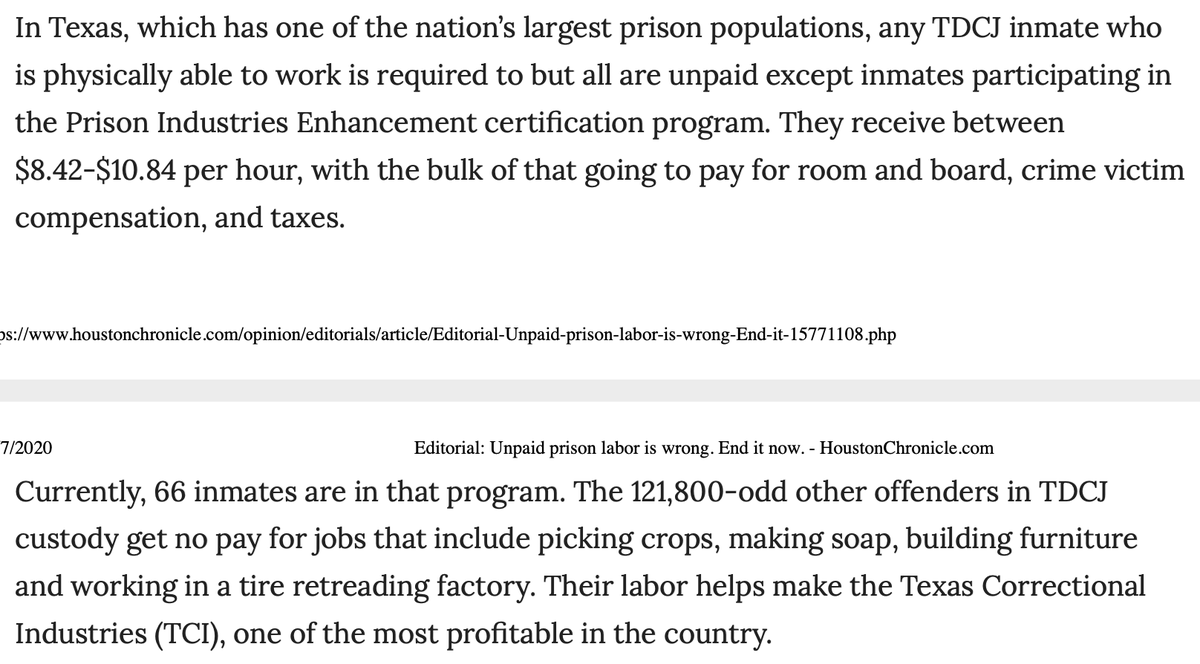A few thoughts sparked by this @HoustonChron editorial on Texas counties using prison labor: https://www.houstonchronicle.com/opinion/editorials/article/Editorial-Unpaid-prison-labor-is-wrong-End-it-15771108.php
1. It provides new info about who ppl in prison are working for. It appears only a tiny minority of ppl in prison in TX - 66 out of 121,000 - are working for companies. (Assumed because private companies are the ones using the PIE certification. Tell us if you know differently!)
2. It notes that people in TX prisons working for private companies are paid $8.42-$10.84 per hour (companies are required to pay prevailing local wages). But "the bulk of that goes to pay for room and board, crime victim compensation, and taxes."
To be sure, many ppl in prison are going to have to pay debts to the justice system no matter what. But unlike most people with debt, incarcerated ppl have no choice in when or how they pay it. The money is sucked out of their paychecks in advance. Indentured servitude.
To look at this another way, even when incarcerated ppl are working for private companies, they are generating value for the state of Texas. This confirms what we know about prison labor generally: The main beneficiaries are state agencies, particularly the prison system itself.
3. Texas Correctional Industries, which sells prison labor and prison-made products to govt agencies, is making a whole lot of money. $73.8 million in sales in 2019. (Though the editorial doesn't say how much is profit vs. gross revenue.)
(This isn't a given - state-run prison industries can be unprofitable. For example:
http://projects.seattletimes.com/2014/prison-labor/1/ )
http://projects.seattletimes.com/2014/prison-labor/1/ )
4. The editorial focuses on a contract Houston awarded to TCI to replace tire treads on city trucks. Later, it changed its mind and gave the contract to the only other bidder (a company called Southern Tire Mart). What's confusing is that...(cont'd)
...when Southern Tire Mart had *initially* bid for the contract, according to @dylmcguinness last week, it bid $750k higher than TCI. But in the end, Southern Tire Mart's bid ended up being only $422k higher than what TCI had offered. Why the apparent $300k drop? (cont'd)
Could be a lot of reasons, but one explanation is that during the initial round of bidding, Houston didn't even bother to negotiate with the only private bidder. It just decided to save money by going with Texas Correctional Industries.
Ultimately, the positive  takeaway here is: Cities and counties can push back against prison slavery by refusing to buy goods or services made by the prison system. Houston has set an example.
takeaway here is: Cities and counties can push back against prison slavery by refusing to buy goods or services made by the prison system. Houston has set an example.
 takeaway here is: Cities and counties can push back against prison slavery by refusing to buy goods or services made by the prison system. Houston has set an example.
takeaway here is: Cities and counties can push back against prison slavery by refusing to buy goods or services made by the prison system. Houston has set an example.
(And a final thought: Given that there was only one private bidder on the Houston contract, it suggests that the local job market for people in this particular industry is low. So how can TDJC claim that performing this labor serves as valuable training for incarcerated people?)

 Read on Twitter
Read on Twitter


